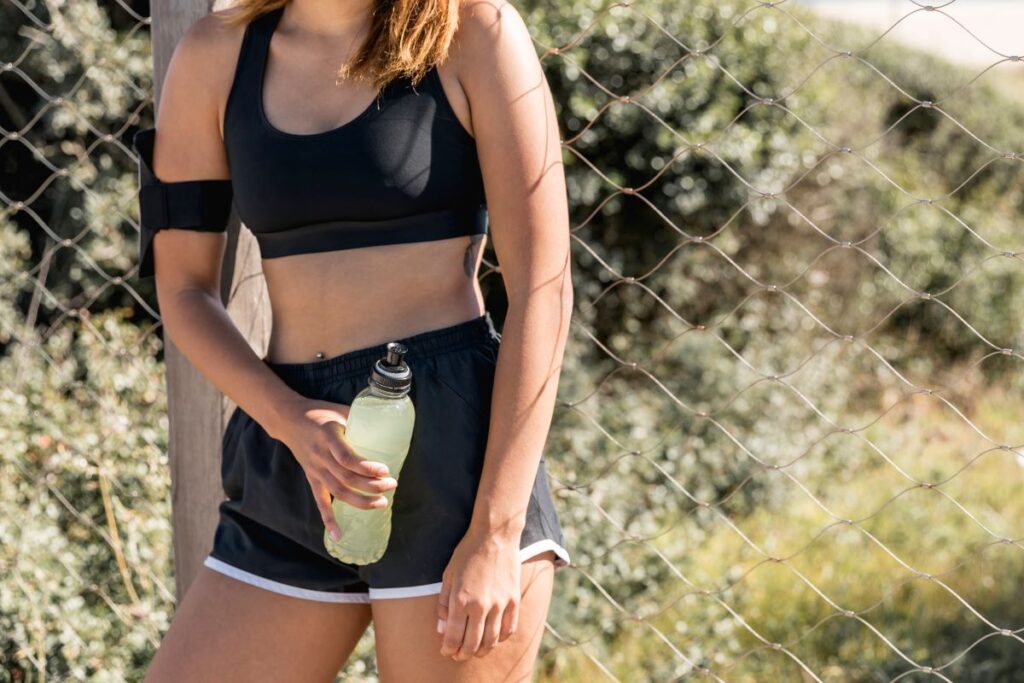Electrolyte Powders: Essential Insights for Optimal Hydration and Performance

By Rebecca Jaspan, MPH, RD, CEDS, CDCES
For endurance athletes, there’s no doubt that staying hydrated is important for optimal functioning and athletic performance. But sometimes water is not enough to do the job.
The body needs a balance of water and electrolytes—minerals required for basic metabolic functions and chemical reactions, such as regulating pH, fluid balance, and muscle contractions. These electrolytes include sodium, potassium, phosphorus, magnesium, and chloride, which keep your body healthy and functioning properly.1
One way to meet your needs for these minerals is through the use of electrolyte powders. They can be mixed with water or another drink and are easy to transport and consume on the go. Depending on the version you purchase, some may even contain vitamins, antioxidants, and carbohydrates.
What is Electrolyte Powder?
Electrolyte powders are essential minerals packaged in powder form that are typically flavored and are added to liquids. Commonly used in water or juice, they can also enhance both the flavor and electrolyte content of milk, smoothies, coffee, or tea. There are a number of different electrolyte powders available. Some contain pure forms of electrolytes while others have added caffeine, vitamins, antioxidants, and carbohydrates.
Benefits of using electrolyte powders include improved hydration, better athletic performance, enhanced recovery of muscles and tissues, and healthy cellular and nerve function.2 Not only do athletes lose electrolytes through sweat, but they also have an increased need for rapid muscle contraction and relaxation, nerve function, and even enhanced cognitive function when training and participating in sports. Minor dehydration typically doesn’t result in negative performance effects or symptoms, but moderate to severe levels can pose a risk.3
For athletes, electrolytes are often preferred over plain water because they are excreted through sweat. Replacing what is lost helps ensure better muscle and nerve reaction times and prevents muscle cramps during exercise. While athletes usually need to increase their fluid intake, drinking water alone can lead to overhydration and a critical condition called hyponatremia, or low sodium levels. This can lead to symptoms of confusion, nausea, delirium, and even coma and death.
While every athletes’ electrolyte needs are a little bit different, you can calculate your sweat rate to determine how much fluid and electrolytes you are losing during a workout.4 To calculate your sweat rate, you need your pre-exercise body weight – post exercise body weight + fluid intake – urine volume/exercise time in hours. Paying attention to your urine color and how you feel can also be easier than an exact measurement.
At a baseline, athletes need a minimum of 2300 milligrams of sodium per day. Women need 310-320 milligrams of magnesium and men need 400-420 milligrams. Between 3500-4700 milligrams of potassium are needed daily. Of course, you can meet most of your needs through food and electrolyte powders give you the extra boost and hydration reassurance.4
Using electrolyte powders helps keep fluid levels balanced and prevents symptoms of under- or overhydration. What’s more, the regular replenishment of salt can decrease the risk of developing cramps during exercise.5
After a strenuous workout, injury, or surgery, replenishing electrolytes as quickly as possible helps promote tissue recovery. Electrolytes—especially sodium—allow nutrients to move to healing tissues through a cellular process called osmosis.
Additionally, calcium, another electrolyte, is involved in blood clotting and bone health, which is essential to healing after exercise, injury, or surgery.6 This is why surgical patients are given intravenous (IV) fluids for efficient administration of electrolytes. Using electrolyte powders regularly can help your body with tissue and muscle recovery needed after exercise or injury.
What to Look For
When choosing an electrolyte powder, there are a number of factors to take into consideration. The best ones for hydration contain a balanced mix of the essential electrolytes sodium, potassium, calcium, and magnesium. Depending on the type of exercise you are doing, you may also want your electrolyte powder to contain some carbohydrates. This may be helpful if you are a runner or endurance athlete engaging in prolonged high-intensity exercise. You may also want to consider taste, portability, mixability, and price.
Our Recommendations
Here are our recommendations for the best electrolyte powders. Be sure to speak with your registered dietitian for recommendations on which electrolyte powders align with your specific goals and individual needs.
LMNT Electrolyte Drink Mix contains 1000mg of sodium, 200mg of potassium, and 60mg of magnesium. With some of the highest contents of sodium on the market, LMNT contains the ideal formulation of essential electrolytes for endurance athletes, especially heavy sweaters or those exercising in hot climates. These stick packs come in a variety of flavors and don’t contain any sugar so they may need to be consumed along with a source of carbohydrates.
With 510mg of sodium and 380mg of potassium, Liquid IV Hydration Multiplier provides essential electrolytes as well as Vitamin C and B vitamins for antioxidants and energy. Liquid IV also contains 11 grams of sugar for a carbohydrate boost before, during, or after your workout.
Nuun Sport Hydration comes in a convenient portable tablet that can be easily added to a water bottle. Each tablet contains a good mixture of 300mg of sodium, 150mg of potassium, 25mg of magnesium, and 13mg of calcium. You buy these tablets in both non-caffeinated and caffeinated flavors.
Skratch Labs Hydration Sports Drink Mix contains all four essential electrolytes along with 19 grams sugar, making this another good option for long distance runners and endurance athletes. The electrolyte formulation includes 380mg of sodium, 39mg of potassium, 39mg of magnesium, and 44mg of calcium and they come in caffeinated and non-caffeinated flavors.
Kaged Hydra Charge electrolyte powder is unique in its addition of antioxidants. During intense exercise, the body produces larger amounts of free radicals and antioxidants are compounds that help fight these free radicals. The blend also offers 115mg of sodium, 107mg of potassium, 15mg of magnesium, and 37mg of calcium.
- Noda M, Matsuda T. Central regulation of body fluid homeostasis. Proc Jpn Acad Ser B Phys Biol Sci. 2022;98(7):283-324. doi:10.2183/pjab.98.016
- Armstrong LE. Rehydration during endurance exercise: Challenges, research, options, methods. Nutrients. 2021;13(3):887. doi:10.3390/nu13030887
- Armstrong LE. Rehydration during endurance exercise: Challenges, research, options, methods. Nutrients. 2021;13(3):887. doi:10.3390/nu13030887
- Buono MJ, Claros R, Deboer T, Wong J. Na+ secretion rate increases proportionally more than the Na+ reabsorption rate with increases in sweat rate. J Appl Physiol (1985). 2008;105(4):1044-1048. doi:10.1152/japplphysiol.90503.2008
- Kerksick CM, Wilborn CD, Roberts MD, et al. ISSN exercise & sports nutrition review update: Research & recommendations. Journal of the International Society of Sports Nutrition. 2018;15(1):38. doi:10.1186/s12970-018-0242-y
- DeBot M, Sauaia A, Schaid T, Moore EE. Trauma-induced hypocalcemia. Transfusion. 2022;62 Suppl 1:S274-S280. doi:10.1111/trf.16959







